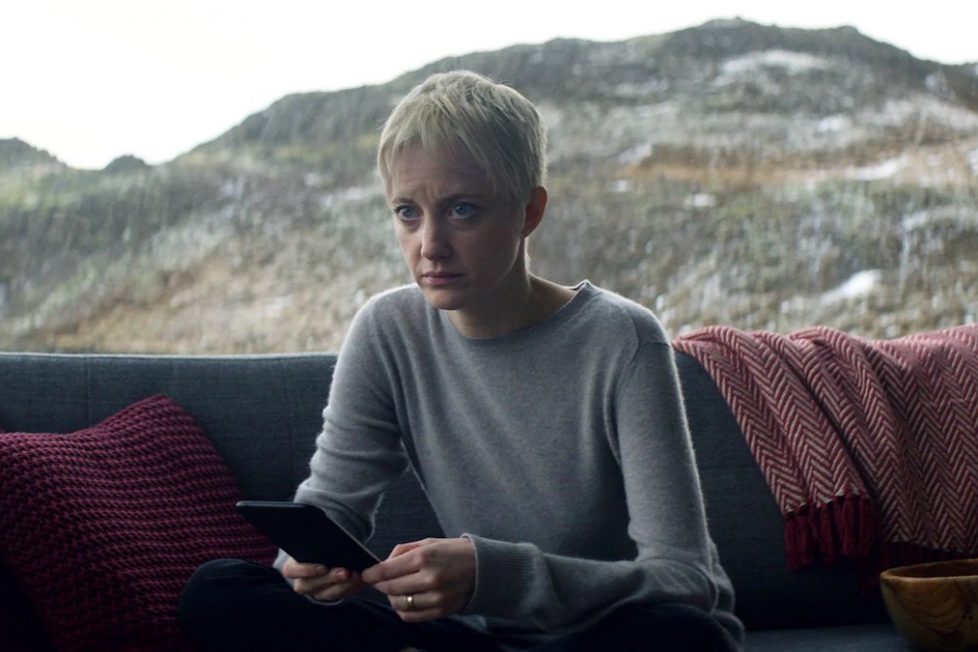BLACK MIRROR, 4.3 – ‘Crocodile’


I spend every episode of Black Mirror hunting for signs of a technology the story will revolve around, but “Crocodile” kept its tech hidden for a long time. The story began with a straightforward horror scenario, as young clubbers Rob (Andrew Gower) and Mia (Andrea Riseborough) travelled back home after a night partying, only to accidentally hit and kill a boy cyclist on a remote mountain road. It’s a familiar setup to have ordinary people do something terrible, then decide to hide the crime to save their own skins, so there’s nothing too shocking when Rob persuades his girlfriend to weigh down the dead body in a sleeping bag and toss it into the icy depths of a nearby lake.
Fifteen years later, Mia has a successful career and is married with a nine-year-old son, whereas Rob’s a guilt-stricken failure. He arrives at the hotel Mia’s staying in on a business trip, announcing he’s going to confess to manslaughter to give his victim’s mother closure over her child’s “disappearance” years ago, but his accomplice has more to lose and doesn’t agree they should come clean. And so, in a moment of madness, she accidentally concusses Rob while trying to change his mind, and proceeds to strangle him to death.
Until then, you’d be hard-pressed to see why “Crocodile” earns a place in the Black Mirror universe, but all becomes clear when an unrelated criminal investigation starts to close in on Mia. On the night Rob was murdered, a pedestrian was run over by a driverless pizza delivery truck outside Mia’s hotel, and an insurance investigator called Shazia (Kiran Sonia Sawar) is interviewing witnesses to build a case so her client can claim compensation from the pizzeria. To aide this, Shazia uses a device called a ‘Recaller’, which corroborates witness testimonies by allowing her to see what people are remembering as they talk to her. And as Shazia’s various interviews progress from person to person, eventually Mia’s testimony is required because she was standing in her hotel room window when the accident occurred.
There are two issues with “Crocodile” which prevent it becoming anything more than average for a show like Black Mirror, where expectations are admittedly very high. Firstly, it takes far long for the technological angle of the story to come into focus, meaning some will feel this instalment only has a tangential reason to call itself a Black Mirror episode. I was prepared to give it some time, so it wasn’t too much of an issue for me, but the second problem exacerbated my disappointment. Once the story introduces an investigator with a machine that can pluck memories from people’s heads… it becomes very obvious where things are headed. And while I hoped Charlie Brooker would swerve expectations somehow, “Crocodile” goes the way everyone with half a brain is expecting it to. Shazia has to interview Mia, who can’t cheat the machine with her fake alibi, and things take a nasty turn…
It’s a shame the script doesn’t land many surprises, beyond a sinister moment involving a toddler that one might argue was added for shock value. I wasn’t convinced Mia would become into a serial killer through sheer desperation, as not enough was done to make you believe she wouldn’t just come clean after killing Rob. Once the body count starts to rise, there’s clearly something very ugly about Mia’s soul that wasn’t foreshadowed.
Riseborough certainly makes the character of Mia work better than what’s on the page, as she’s a fantastic actress, who fought for this role despite it originating as a male character, but there are still these gaps to making me believe in her actions.
John Hillcoat (The Road) helmed this episode, which was filmed on location in Iceland, and the Canadian-Australian director certainly captured the slightly odd and desolate feel of the wintry island. There are some beautiful and majestic landscape shots everywhere, that are also very eerie, evoking a Nordic Noir vibe. You perhaps can’t escape that, given the protagonist turns to coldblooded murder to keep a dark secret.
While this wasn’t a terrible episode unworthy of anyone’s time, it was perhaps a little too detached from the kind of material one expects from Black Mirror. The Recall device wasn’t a very original concept, and its appearance led to a predictability over how things would end that wasn’t subverted. Part of the reason I enjoy Black Mirror is seeing how it pushes the envelope and can outmanoeuvres your own darkest thoughts, but this didn’t manage that difficult trick.
